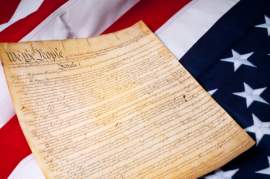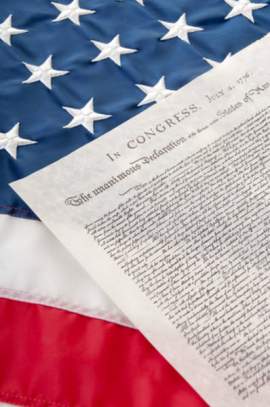
Neutrality Act Text

Popular In Constitution
Purpose Of Lifetime Appointment And Pros And Cons Enumerated Powers Bicameral Legislature Background Article 3 Of The Constitution We The People 1st Amendment Who Wrote The Constitution Judicial Review Equal Protection Clause 5th Amendment 10th Amendment Three Fifths Compromise
"Neutrality Act" of 1937 JOINT RESOLUTION
To amend the joint resolution entitled "Joint resolution providing for the prohibition of the export of arms, ammunition, and implements of war to belligerent countries; the prohibition of the transportation of arms, ammunition, and implements of war by vessels of the United States for the use of belligerent states; for the registration and licensing of persons engaged in the business of manufacturing, exporting, or importing arms, ammunition, or implements of war; and restricting travel by American citizens on belligerent ships during war", approved August 31, 1935, as amended.
Resolved by the Senate and House of Representatives of the United States of America in Congress assembled, That the joint resolution entitled "Joint resolution providing for the prohibition of the export of arms, ammunition, and implements of war to belligerent countries; the prohibition of the transportation of arms, ammunition, and implements of war by vessels of the United States for the use of belligerent states; for the registration and licensing of persons engaged in the business of manufacturing, exporting, or importing arms, ammunition, or implements of war; and restricting travel by American citizens on belligerent ships during war", approved August 31, 1935, as amended, is amended to read as follows:
EXPORT OF ARMS, AMMUNITION, AND IMPLEMENTS OF WAR
SECTION 1. (a) Whenever the President shall find that there exists a state of war between, or among, two or more foreign states, the President shall proclaim such fact, and it shall thereafter be unlawful to export, or attempt to export, or cause to be exported, arms, ammunition, or implements of war from any place in the United States to any belligerent state named in such proclamation, or to any neutral state for transshipment to, or for the use of, any such belligerent state.
(b) The President shall, from time to time, by proclamation, extend such embargo upon the export of arms, ammunition, or implements of war to other states as and when they may become involved in such war.
(c) Whenever the President shall find that a state of civil strife exists in a foreign state and that such civil strife is of a magnitude or is being conducted under such conditions that the export of arms, ammunition, or implements of war from the United foreign state would threaten or endanger the peace of the United States, the President shall proclaim such fact, and it shall thereafter be unlawful to export, or attempt to export, or cause to be exported, arms, ammunition, or implements of war from any place in the United States to such foreign state, or to any neutral state for transshipment to, or for the use of, such foreign state.
(d) The President shall, from time to time by proclamation, definitely enumerate the arms, ammunition, and implements of war, the export of which is prohibited by this section. The arms, ammunition, and implements of war so enumerated shall include those enumerated in the President�s proclamation Numbered 2163, of April 10, 1936, but shall not include raw materials or any other articles or materials not of the same general character as those enumerated in the said proclamation, and in the Convention for the Supervision of the International Trade in Arms and Ammunition and in Implements of War, signed at Geneva June 17, 1925.
(e) Whoever, in violation of any of the provisions of this Act, shall export, or attempt to export, or cause to be exported, arms, ammunition, or implements of war from the United States shall be fined not more than $10,000, or imprisoned not more than five years, or both, and the property, vessel, or vehicle containing the same shall be subject to the provisions of sections 1 to 8, inclusive, title 6, chapter 30, of the Act approved June 15, 1917 (40 Stat. 223-225; U. S. C., 1934 ed., title 22, sess. 238-245).
(f) In the case of the forfeiture of any arms, ammunition, or implements of war by reason of a violation of this Act. no public or private sale shall be required; but such arms, ammunition, or implements of war shall be delivered to the Secretary of War for such use or disposal thereof as shall be approved by the President of the United States.
(g) Whenever, in the judgment of the President, the conditions which have caused him to issue any proclamation under the authority of this section have ceased to exist, he shall revoke the same, and the provisions of this section shall thereupon cease to apply with respect to the state or states named in such proclamation, except with respect to offenses committed, or forfeitures incurred, prior to such revocation.
EXPORT OF OTHER ARTICLES AND MATERIALS
SEC. 2. (a) Whenever the President shall have issued a proclamation under the authority of section 1 of this Act and he shall thereafter find that the placing of restrictions on the shipment of certain articles or materials in addition to arms, ammunition, and implements of war from the United States to belligerent states, or to a state wherein civil strife exists, is necessary to promote the security or preserve the peace of the United States or to protect the lives of citizens of the United States, he shall so proclaim, and it shall thereafter be unlawful, except under such limitations and exceptions as the President may prescribe as to lakes, rivers, and inland waters bordering on the United States, and as to transportation on or over lands bordering on the United States, for any American vessel to carry such articles or materials to any belligerent state, or to any state wherein civil strife exists, named in such proclamation issued under the authority of section 1 of this Act, or to any neutral state for transshipment to, or for the use of, any such belligerent state or any such state wherein civil strife exists. The President shall by proclamation from time to time definitely enumerate the articles and materials which it shall be unlawful for American vessels to so transport.
(b) Whenever the President shall have issued a proclamation under the authority of section 1 of this Act and he shall thereafter find that the placing of restrictions on the export of articles or materials from the United States to belligerent states, or to a state wherein civil strife exists, is necessary to promote the security or preserve the peace of the United States or to protect the lives or commerce of citizens of the United States, he shall so proclaim, and it shall thereafter be unlawful, except under such limitations and exceptions as the President may prescribe as to lakes, rivers, and inland waters bordering on the United States, and as to transportation on or over land bordering on the United States, to export or transport, or attempt to export or transport, or cause to be exported or transported, from the United States to any belligerent state, or to any state wherein civil strife exists, named in such proclamation issued under the authority of section 1 of this Act, or to any neutral state for transshipment to, or for the use of, any such belligerent state or any such state wherein civil strife exists, any articles or materials whatever until all right, title, and interest therein shall have been transferred to some foreign government, agency, institution, association, partnership, corporation, or national. The shipper of such articles or materials shall be required to file with the collector of the port from which they are to be exported a declaration under oath that there exists in citizens of the United States no right, title, or interest in such articles or materials, and to comply with such rules and regulations as shall be promulgated from time to time by the President. Any such declaration so filed shall be a conclusive estoppel against any claim of any citizen of the United States of right, title, or interest in such articles or materials. Insurance written by underwriters on any articles or materials the export of which is prohibited by this Act, or on articles or materials carried by an American vessel in violation of subsection (a) of this section, shall not be deemed an American interest therein, and no insurance policy issued on such articles or materials and no loss incurred thereunder or by the owner of the vessel carrying the same shall be made a basis of any claim put forward by the Government of the United States.
(c) The President shall from time to time by proclamation extend such restrictions as are imposed under the authority of this section to other states as and when they may be declared to become belligerent states under proclamations issued under the authority of section 1 of this Act.
(d) The President may from time to time change, modify, or revoke in whole or in part any proclamations issued by him under the authority of this section.
(e) Except with respect to offenses committed, or forfeitures incurred, prior to May 1, 1939, this section and all proclamations issued thereunder shall not be effective after May 1, 1939.
FINANCIAL TRANSACTIONS
SEC. 3. (a) Whenever the President shall have issued a proclamation under the authority of section 1 of this Act, it shall thereafter be unlawful for any person within the United States to purchase, sell, or exchange bonds, securities, or other obligations of the government of any belligerent state or of any state wherein civil strife exists, named in such proclamation, or of any political subdivision of any such state, or of any person acting for or on behalf of the government of any such state, or of any faction or asserted government within any such state wherein civil strife exists, or of any person acting for or on behalf of any faction or asserted government within any such state wherein civil strife exists, issued after the date of such proclamation, or to make any loan or extend any credit to any such government, political subdivision, faction, asserted government, or person, or to solicit or receive any contribution for any such government, political subdivision, faction, asserted government, or person: Provided, That if the President shall find that such action will serve to protect the commercial or other interests of the United States or its citizens, he may, in his discretion, and to such extent and under such regulations as he may prescribe, except from the operation of this section ordinary commercial credits and short-time obligations in aid of legal transactions and of a character customarily used in normal peacetime commercial transactions. Nothing in this subsection shall be construed to prohibit the solicitation or collection of funds to be used for medical aid and assistance, or for food and clothing to relieve human suffering, when such solicitation or collection of funds is made on behalf of and for use by any person or organization which is not acting for or on behalf of any such government, political subdivision, faction, or asserted government, but all such solicitations and collections of funds shall be subject to the approval of the President and shall be made under such rules and regulations as he shall prescribe.
(b) The provisions of this section shall not apply to a renewal or adjustment of such indebtedness as may exist on the date of the President�s proclamation.
(c) Whoever shall violate the provisions of this section or of any regulations issued hereunder shall, upon conviction thereof, be fined not more than $50,000 or imprisoned for not more than five years, or both. Should the violation be by a corporation, organization, or association, each officer or agent thereof participating in the violation may be liable to the penalty herein prescribed.
(d) Whenever the President shall have revoked any such proclamation issued under the authority of section 1 of this Act, the provisions of this section and of any regulations issued by the President hereunder shall thereupon cease to apply with respect to the state or states named in such proclamation, except with respect to offenses committed prior to such revocation.
EXCEPTIONS-AMERICAN REPUBLICS
SEC. 4. This Act shall not apply to an American republic or republics engaged in war against a non-American state or states, provided the American republic is not cooperating with a non-American state or states in such war.
NATIONAL MUNITIONS CONTROL BOARD
SEC. 5. (a) There is hereby established a National Munitions Control Board (hereinafter referred to as the �Board�) to carry out the provisions of this Act. The Board shall consist of the Secretary of State, who shall be chairman and executive officer of the Board, the Secretary of the Treasury, the Secretary of War, the Secretary of the Navy, and the Secretary of Commerce. Except as otherwise provided in this Act, or by other law, the administration of this Act is vested in the Department of State. The Secretary of State shall promulgate such rules and regulations with regard to the enforcement of this section as he may deem necessary to carry out its provisions. The Board shall be convened by the chairman and shall hold at least one meeting a year.
(b) Every person who engages in the business of manufacturing, exporting, or importing any of the arms, ammunition, or implements of war referred to in this Act, whether as an exporter, importer, manufacturer, or dealer, shall register with the Secretary of State his name, or business name, principal place of business, and places of business in the United States, and a list of the arms, ammunition, and implements of war which he manufactures, imports, or exports.
(c) Every person required to register under this section shall notify the Secretary of State of any change in the arms, ammunition, or implements of war which he exports, imports, or manufactures; and upon such notification the Secretary of State shall issue to such person an amended certificate of registration, free of charge, which shall remain valid until the date of expiration of the original certificate. Every person required to register under the provisions of this section shall pay a registration fee of $500, unless he manufactured, exported, or imported arms, ammunition, and implements of war to a total sales value of less than $50,000 during the twelve months immediately preceding his registration, in which case he shall pay a registration fee of $100. Upon receipt of the required registration fee, the Secretary of State shall issue a registration certificate valid for five years, which shall be renewable for further periods of five years upon the payment for each renewal of a fee of $500 in the case of persons who manufactured, exported, or imported arms, ammunition, and implements of war to a total sales value of more than $50,000 during the twelve months immediately preceding the renewal, or a fee of $100 in the case of persons who manufactured, exported, or imported arms, ammunition, and implements of war to a total sales value of less than $50,000 during the twelve months immediately preceding the renewal. The Secretary of the Treasury is hereby directed to refund, out of any moneys in the Treasury not otherwise appropriated, the sum of $400 to every person who shall have paid a registration fee of $500 pursuant to this Act, who manufactured, exported, or imported arms, ammunition, and implements of war to a total sales value of less than $50,000 during the twelve months immediately preceding his registration.
(d) It shall be unlawful for any person to export, or attempt to export, from the United States to any other state, any of the arms, ammunition, or implements of war referred to in this Act, or to import, or attempt to import, to the United States from any other state, any of the arms, ammunition, or implements of war referred to in this Act, without first having obtained a license therefor.
(e) All persons required to register under this section shall maintain, subject to the inspection of the Secretary of State, or any person or persons designated by him, such permanent records of manufacture for export, importation, and exportation of arms, ammunition, and implements of war as the Secretary of State shall prescribe.
(f) Licenses shall be issued to persons who have registered as herein provided for, except in cases of export or import licenses where the export of arms, ammunition, or implements of war would be in violation of this Act or any other law of the United States, or of a treaty to which the United States is a party, in which cases such licenses shall not be issued.
(g) Whenever the President shall have issued a proclamation under the authority of section 1 of this Act, all licenses theretofore issued under this Act shall ipso facto and immediately upon the issuance of such proclamation, cease to grant authority to export arms, ammunition, or implements of war from any place in the United States to any belligerent state, or to any state wherein civil strife exists, named in such proclamation, or to any neutral state for transshipment to, or for the use of, any such belligerent state or any such state wherein civil strife exists; and said licenses, insofar as the grant of authority to export to the state or states named in such proclamation is concerned, shall be null and void.
(h) No purchase of arms, ammunition, or implements of war shall be made on behalf of the United States by any officer, executive department, or independent establishment of the Government from any person who shall have failed to register under the provisions of this Act.
(i) The provisions of the Act of August 29, 1916, relating to the sale of ordnance and stores to the Government of Cuba (39 Stat. 619, 643; U. S. C., 1934 ed., title 50, sec. 72), are hereby repealed as of December 31, 1937.
(j) The Board shall make an annual report to Congress, copies of which shall be distributed as are other reports transmitted to Congress. Such reports shall contain such information and data collected by the Board as may be considered of value in the determination of questions connected with the control of trade in arms, ammunition, and implements of war. The Board shall include in such reports a list of all persons required to register under the provisions of this Act, and full information concerning the licenses issued hereunder.
(k) The President is hereby authorized to proclaim upon recommendation of the Board from time to time a list of articles which shall be considered arms, ammunition, and implements of war for the purposes of this section.
AMERICAN VESSELS PROHIBITED FROM CARRYING ARMS TO BELLIGERENT STATES
SEC. 6. (a) Whenever the President shall have issued a proclamation under the authority of section 1 of this Act, it shall thereafter be unlawful, until such proclamation is revoked, for any American vessel to carry any arms, ammunition, or implements of war to any belligerent state, or to any state wherein civil strife exists, named in such proclamation, or to any neutral state for transshipment to, or for the use of, any such belligerent state or any such state wherein civil strife exists.
(b) Whoever, in violation of the provisions of this section shall take, or attempt to take, or shall authorize, hire, or solicit another to take, any American vessel carrying such cargo out of port or from the jurisdiction of the United States shall be fined not more than $10,000, or imprisoned not more than five years, or both; and, in addition, such vessel, and her tackle, apparel, furniture, and equipment, and the arms, ammunition, and implements of war on board, shall be forfeited to the United States.
USE OF AMERICAN PORTS AS BASE OF SUPPLY
SEC. 7. (a) Whenever, during any war in which the United States is neutral, the President, or any person "hereunto authorized by him, shall have cause to believe that any vessel, domestic or foreign, whether requiring clearance or not, is about to carry out of a port of the United States, fuel, men, arms, ammunition, implements of war, or other supplies to any warship, tender, or supply ship of a belligerent state, but the evidence is not deemed sufficient to justify forbidding the departure of the vessel as provided for by section 1, title V, chapter 30, of the Act approved June 15, 1917 (40 Stat. 217, 221; U. S. C., 1934 ed., title 18, sec. 31), and if, in the President�s judgment, such action will serve to maintain peace between the United States and foreign states, or to protect the commercial interests of the United States and its citizens, or to promote the security or neutrality of the United States, he shall have the power and it shall be his duty to require the owner, master, or person in command thereof, before departing from a port of the United States, to give a bond to the United States, with sufficient sureties, in such amount as he shall deem proper, conditioned that the vessel will not deliver the men, or any part of the cargo, to any warship, tender, or supply ship of a belligerent state.
(b) If the President, or any person "hereunto authorized by him, shall find that a vessel, domestic or foreign, in a port of the United States, has previously cleared from a port of the United States during such war and delivered its cargo or any part thereof to a warship, tender, or supply ship of a belligerent state, he may prohibit the departure of such vessel during the duration of the war.
SUBMARINES AND ARMED MERCHANT VESSELS
SEC. 8. Whenever, during any war in which the United States is neutral, the President shall find that special restrictions placed on the use of the ports and territorial waters of the United States by the submarines or armed merchant vessels of a foreign state, will serve to maintain peace between the United States and foreign states, or to protect the commercial interests of the United States and its citizens, or to promote the security of the United States, and shall make proclamation thereof, it shall thereafter be unlawful for any such submarine or armed merchant vessel to enter a port or the territorial waters of the United States or to depart therefrom, except under such conditions and subject to such limitations as the President may prescribe. Whenever, in his judgment, the conditions which have caused him to issue his proclamation have ceased to exist, he shall revoke his proclamation and the provisions of this section shall thereupon cease to apply.
TRAVEL ON VESSELS OF BELLIGERENT STATES
SEC. 9. Whenever the President shall have issued a proclamation under the authority of section 1 of this Act it shall thereafter be unlawful for any citizen of the United States to travel on any vessel of the state or states named in such proclamation, except in accordance with such rules and regulations as the President shall prescribe: Provided, however, That the provisions of this section shall not apply to a citizen of the United States traveling on a vessel whose voyage was begun in advance of the date of the President�s proclamation, and who had no opportunity to discontinue his voyage after that date: and provided: further, That they shall not apply under ninety days after the date of the President�s proclamation to a citizen of the United States returning from a foreign state to the United States. Whenever, in the President�s judgment, the conditions which have caused him to issue his proclamation have ceased to exist, he shall revoke his proclamation and the provisions of this section shall thereupon cease to apply with respect to the state or states named in such proclamation, except with respect to offenses committed prior to such revocation.
ARMING OF AMERICAN MERCHANT VESSELS PROHIBITED
SEC. 10. Whenever the President shall have issued a proclamation under the authority of section 1, it shall thereafter be unlawful, until such proclamation is revoked, for any American vessel engaged in commerce with any belligerent state, or any state wherein civil strife exists, named in such proclamation, to be armed or to carry any armament, arms, ammunition, or implements of war, except small arms and ammunition therefor which the President may deem necessary and shall publicly designate for the preservation of discipline aboard such vessels.
REGULATIONS
SEC. 11. The President may, from time to time, promulgate such rules and regulations, not inconsistent with law, as may be necessary and proper to carry out any of the provisions of this Act; and he may exercise any power or authority conferred on him by this Act through such officer or officers, or agency or agencies, as he shall direct.
GENERAL PENALTY PROVISION
SEC. 12. In every case of the violation of any of the provisions of this Act or of any rule or regulation issued pursuant thereto where a specific penalty is not herein provided, such violator or violators, upon conviction, shall be fined not more than $10,000, or imprisoned not more than five years, or both.
DEFINITIONS
SEC. 13. For the purposes of this Act-
(a) The term �United States�, when used in a geographical sense, includes the several States and Territories, the insular possessions of the United States (including the Philippine Islands), the Canal Zone, and the District of Columbia.
(b) The term �person� includes a partnership, company, association, or corporation, as well as a natural person.
(c) The term �vessel� means every description of watercraft (including aircraft) or other contrivance used, or capable of being used, as a means of transportation on, under, or over water.
(d) The term �American vessel� means any vessel (including aircraft) documented under the laws of the United States.
(e) The term �vehicle� means every description of carriage (including aircraft) or other contrivance used, or capable of being used, as a means of transportation on or over land.
(f) The term �state� shall include nation, government, and country.
SEPARABILITY OF PROVISIONS
SEC. 14. If any of the provisions of this Act, or the application thereof to any person or circumstance, is held invalid, the remainder of the Act, and the application of such provision to other persons or circumstances, shall not be affected thereby.
APPROPRIATIONS
SEC. 15. There is hereby authorized to be appropriated from time to time, out of any money in the Treasury not otherwise appropriated, such amounts as may be necessary to carry out the provisions and accomplish the purposes of this Act."
Approved, May 1, 1937, 6.30 p. m., Central Standard Time.


















